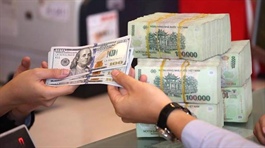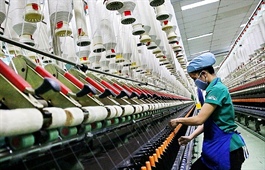Monetary stance points to only mildly higher interest rates in Viet Nam: Fitch Ratings
Monetary stance points to only mildly higher interest rates in Viet Nam: Fitch Ratings
Capital account restrictions largely insulate interest rates in Viet Nam from global monetary tightening and the country’s policy rate is expected to rise 50 basis points to 4.5 per cent by end-2023, according to Fitch Ratings.

Under a report on the impact of rising interest rates on Asia-Pacific (APAC) banks released this week, Fitch said annual credit targeting remains a centrepiece of the State Bank of Vietnam's (SBV) monetary policy framework, and the refinancing rate is not a primary policy lever.
Moreover, strong foreign investment inflows underpin the dong's resilience, which has depreciated by only 2 per cent year-to-date by end-July 2022, making it the second-best performing currency in APAC behind only the Hong Kong dollar.
According to Fitch, Viet Nam’s rates are driven chiefly by economic activity and inflation.
“Lending rates in Viet Nam are driven chiefly by credit demand since its supply is pre-determined by SBV's annual quota. Meanwhile, deposit rates are influenced by the need to fund these assets, and are sensitive to depositors' expectations on inflation. Interest rates are therefore edging up as economic activity and inflation quicken, but are little correlated with the US Fed's inclinations,” Fitch said in the report.
Price pressures have intensified in recent months, but are manageable relative to other regional emerging markets and remain under the government's target of 4 per cent for the year.
According to Fitch, net interest margins (NIMs) are buoyed by new credit demand rather than higher rates. Viet Nam's economic rebound and the SBV's guidance for banks to support the economy has caused loan growth to accelerate in Q1 2022 and the system loan/deposit ratio to race towards 100 per cent.
Banks have been raising deposit rates in recent months to fund growth, while yields are also rising but partly constrained by social pressure to keep lending rates low to aid borrowers trying to get back on their feet after the pandemic. Nominal lending spreads are therefore little changed, but higher balance-sheet leverage is nevertheless lifting banks' NIMs.
Fitch said rapid loan growth and high credit intensity are key asset-quality risks for Vietnamese banks. System loans have grown by a compound annual growth rate (CAGR) of 14 per cent in the past five years, and continue to outpace nominal GDP growth. This has pushed up the credit/GDP ratio further, which was already one of the highest among 'BB' rated markets. High and rising system leverage is a structural risk in the banking sector, with much hinging on the economy continuing to perform strongly. Corporate leverage is high and interest-rate hedges are uncommon, making borrowers vulnerable to any unexpected spike in interest rates.
Under the report, Fitch noted credit reserves of Vietnamese banks improve, but their capitalisation buffers remain thin. The rapid pace of credit expansion during the sharp economic slowdown of the past two years could contain latent impairment risks. Some of these risks may loom as pandemic debt relief has recently expired.
SBV's Circular No.03/2021/TT-NHNN requires banks to provision for restructured loans in advance, and this is reflected in banks' significantly improved loan-loss reserves. However, capital ratios remain thin due to persistently high loan growth, which could leave banks vulnerable to any new economic shocks.
According to the report, most APAC banks will benefit from rising interest rates, but their asset quality risks warrant attention. Global inflationary pressures are pushing many APAC markets into what is likely to be the most meaningful monetary tightening cycle in almost two decades. Most banks will benefit from higher interest rates to the extent that NIMs widen. The upside is likely to be highest in Hong Kong and Singapore.
In general, asset-quality vulnerabilities of most APAC banks appear well contained. These risks should not be dismissed, though, after a long period of broadly supportive monetary policy, particularly in markets where leverage and asset prices have increased.























